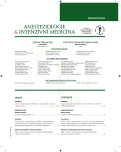-
Medical journals
- Career
The role of antithrombin and thromboelastography in the management of early disseminated intravascular coagulopathy following peripartum hysterectomy
Authors: M. Durila 1; L. Teslík 2; M. Astraverkhava 1; T. Vymazal 1
Authors‘ workplace: Klinika anesteziologie, resuscitace a intenzivní medicíny, 2. LF UK a FN v Motole, Praha 1; Gynekologicko-porodnická klinika, 2. LF UK a FN v Motole, Praha 2
Published in: Anest. intenziv. Med., 27, 2016, č. 2, s. 75-77
Category: Anaesthesiology - Case Report
Overview
Disseminated intravascular coagulopathy is a life threatening condition, which can develop after hysterectomy performed because of peripartum life threatening bleeding in pregnant women. We present a case report where the laboratory and thromboelastography results indicating consumptive coagulopathy improved after the administration of antithrombin alone. In this case report we can see that antithrombin can help in the treatment of consumptive coagulopathy when administered at the right moment. Thromboelastography can be used for the diagnosis and monitoring of coagulopathy but it is also necessary to determine the antithrombin level because the same thromboelastography hypocoagulation pattern can be found in chronic autoimmune conditions with normal antithrombin level, e.g. in ulcerative colitis.
KEYWORDS:
antithrombin – haemorrhage – disseminated intravascular coagulation – hysterectomy – thromboelastography
Sources
1. Abdul-Kadir, R., McLintock, C., Ducloy, A. S. et al. Evaluation and management of postpartum hemorrhage: consensus from an international expert panel. Transfusion, 2014, 54, 7, p. 1756–1768.
2. Krishna, H., Chava, M., Jasmine, N., Shetty, N. Patients with postpartum hemorrhage admitted in intensive care unit: Patient condition, interventions, and outcome. J. Anaesthesiol. Clin. Pharmacol., 2011, 27, 2, p. 192–194.
3. Wada, H., Asakura, H., Okamoto, K. et al. Expert consensus for the treatment of disseminated intravascular coagulation in Japan. Thromb. Res., 2010, 125, 1, p. 6–11.
4. Sharma, P., Saxena, R. A novel thromboelastographic score to identify overt disseminated intravascular coagulation resulting in a hypocoagulable state. Am. J. Clin. Pathol., 2010, 134, 1, p. 97–102.
5. Warren, B. L., Eid, A., Singer, P. et al. Caring for the critically ill patient. High-dose antithrombin III in severe sepsis: a randomized controlled trial. JAMA, 2001, 286, 15, p. 1869–1878.
6. Kienast, J., Juers, M., Wiedermann, C. J. et al. Treatment effects of high-dose antithrombin without concomitant heparin in patients with severe sepsis with or without disseminated intravascular coagulation. J. Thromb. Haemost., 2006, 4, 1, p. 90–97.
Labels
Anaesthesiology, Resuscitation and Inten Intensive Care Medicine
Article was published inAnaesthesiology and Intensive Care Medicine

2016 Issue 2-
All articles in this issue
- Malignant hyperthermia
- The role of antithrombin and thromboelastography in the management of early disseminated intravascular coagulopathy following peripartum hysterectomy
- Current opinion on caudal epidural blockade and its complications in children
- Sleep disturbances in perioperative and ICU patients – review
- Alarmins and their role in perioperative medicine
- Intravenous fluid therapy in intensive care
- Practice Guidelines for the Prevention, Detection, and Management of Respiratory Depression Associated with Neuraxial Opioid Administration: An Updated Report by the American Society of Anesthesiologists Task Force on Neuraxial Opioids and the American Society of Regional Anesthesia and Pain Medicine
- The Spireta Project
- Anaesthesiology and Intensive Care Medicine
- Journal archive
- Current issue
- Online only
- About the journal
Most read in this issue- Malignant hyperthermia
- Current opinion on caudal epidural blockade and its complications in children
- Intravenous fluid therapy in intensive care
- Sleep disturbances in perioperative and ICU patients – review
Login#ADS_BOTTOM_SCRIPTS#Forgotten passwordEnter the email address that you registered with. We will send you instructions on how to set a new password.
- Career

